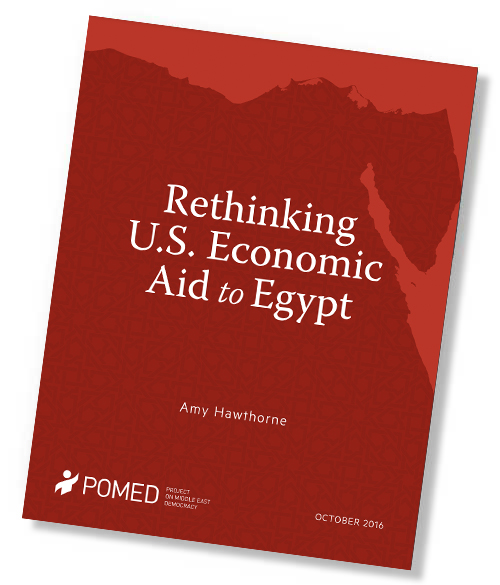In a new POMED Report, “Rethinking U.S. Economic Aid to Egypt,” POMED Deputy Director for Research Amy Hawthorne takes a detailed look at U.S. bilateral economic aid for Egypt. Since the 1979 Egypt-Israel Peace Treaty, economic assistance, along with military aid, has been a pillar of the U.S.-Egypt relationship. The aid relationship often has been contentious and the program has long needed an overhaul, but it has especially struggled for purposed and direction since 2011, in the face of growing Egyptian government restrictions. As frustration and fatigue has grown among American officials, some question whether maintaining the aid still serves U.S. interests.
 Despite its limitations, economic aid remains an essential tool to help address Egypt’s development challenges and to engage positively with Egypt’s citizens in a relationship otherwise dominated by security cooperation with an authoritarian regime. Thus, the paper argues that the next U.S. administration should make efforts to continue the bilateral economic aid program, though significant changes are needed to enable the assistance to achieve its objectives in an extremely difficult context.
Despite its limitations, economic aid remains an essential tool to help address Egypt’s development challenges and to engage positively with Egypt’s citizens in a relationship otherwise dominated by security cooperation with an authoritarian regime. Thus, the paper argues that the next U.S. administration should make efforts to continue the bilateral economic aid program, though significant changes are needed to enable the assistance to achieve its objectives in an extremely difficult context.
The paper reviews the history of the bilateral U.S. economic assistance program, explains how the aid program operates, and analyzes why the assistance, despite some important achievements and a nearly $28 billion investment since 1975, has not accomplished more. Finally, the paper describes the principal changes that the next U.S. administration should pursue, with the support of Congress. These changes should include:
- Simplifying the program by focusing on a few practical initiatives, such as scholarships and job-creation through new businesses, that would benefit ordinary Egyptian citizens, play to American strengths, and depend less upon cooperation with Egypt’s repressive government;
- Discontinuing ineffective efforts to use aid to encourage the government to undertake economic and democratic reforms for which it has no evident political will, including “democracy” projects with nondemocratic state institutions;
- Ending democracy assistance as part of the bilateral program and instead supporting genuine, independent pro-democracy organizations and individuals through more arms-length funding, and through high-level diplomatic advocacy for human rights and democratic values; and
- Improving public diplomacy efforts to provide more information about U.S. assistance to the Egyptian public.
The full report is available here.



